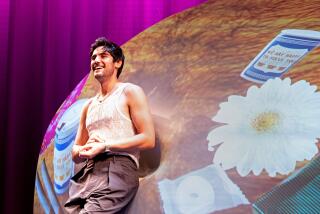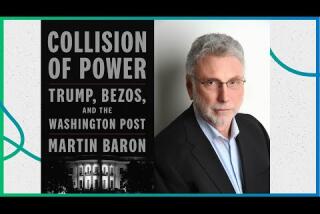Marc Maron chats about writing, babies and âAttempting Normalâ

Comedians publishing humorous autobiographies -- quirky retellings of the boozy nights on the road, the broken hearts and broken (sitcom) dreams -- seems a rite of passage these days, along with the requisite podcast, Twitter account and digital comedy special.
Marc Maron has perfected all those comedy offshoots -- his popular podcast, âWTF with Marc Maron,â is nearing 400 episodes and heâs prolific, if a bit hilariously neurotic, on Twitter. He just taped a 90-minute Netflix special, due out in June, and heâs landed a sitcom, âMaron,â which debuts Friday on IFC.
Then Maronâs memoir, âAttempting Normal,â out this week from Spiegel & Grau, found its way to my desk. The essayistic collection, spanning Maronâs peripatetic, near-30-year comedy career on radio, TV, in print and on the Web, is not only funny, it is surprisingly deep, at times laced with revelatory insights.
The book is reminiscent of Spalding Grayâs or Eric Bogosianâs work in that itâs both conversational and writerly at once, but itâs shot through with that particular Maron-esque combination of brooding, unapologetic confession, self-analysis and vulnerability. Anecdotes swing from straightforward sob stories of divorce and drug addiction to brutally honest tidbits (like Maronâs unsexy encounter with a prostitute who has him examine her breasts for lumps) to bursts of self-awareness.
He chose comedy, he wrote, âbecause I needed to finish the construction of myself.â
âAttempting Normalâ isnât Maronâs first book. He published âThe Jerusalem Syndrome,â based on his one-man show of the same name, in 2001. But the newer book was written from scratch, he said, so it was a little more difficult.
âI didnât really want to write a second book, because itâs hard, itâs taxing and Iâm not a professional writer,â Maron said over dinner recently. â[But] I needed to make money; I wasnât making any money on the podcast.â
He said the book took more than a year to write, during which time he had some assistance.
âI have a slightly obsessive fan who transcribes all of my monologues, so I had thousands of pages of me talking as a resource,â he said. âBut I didnât want to lean on the monologues too much. I wanted to write and to stretch.â
Of all Maronâs stories, one of the most memorable is âBabiesâ: Maronâs live-in girlfriend, Jessica, wants kids; Maron is freaked out by the prospect.
â[Not having kids] I could put an end to the genetic bundle of selfishness, depression and anger that has tumbled down through time along my fatherâs line of descent,â he wrote in the book. âI would be doing the world a favor.â
Itâs an ongoing battle, Maron explained, and in the book, he doesnât offer much closure. The story ends on a poignant note with Jessica telling him: âI love you ... but Iâm not going to hang around forever.â
When asked about this over dinner, Maron candidly responded.
âI worry about the age thing, Iâm almost 50 years old!â he said. âBut I like kids, I get along with kids, and I think emotionally, this would be the time -- I donât think I would have been ready previous to this.â
There was a short silence -- the first all throughout dinner -- before Maron continued. âSo I think weâre gonna do that,â he said. âIf things donât fall apart first.â
ALSO:
Beastie Boys memoir in the works: no sleep til deadline?
A gallery of James Francoâs literary films: The list just keeps growing
More to Read
Sign up for our Book Club newsletter
Get the latest news, events and more from the Los Angeles Times Book Club, and help us get L.A. reading and talking.
You may occasionally receive promotional content from the Los Angeles Times.









